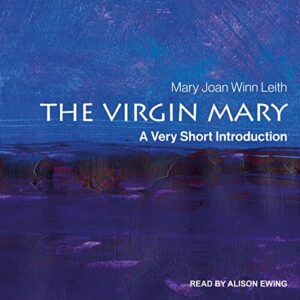 Summary: Mary matters, but the response to her is widely varied.
Summary: Mary matters, but the response to her is widely varied.
After finishing Jesus Wars, I wanted to pick up The Virgin Mary: A Very Short Introduction because I was surprised at how large of a role Mary played in trinitarian debates of the early centuries of Christianity (the idea of Mary, not the actual person of Mary). I have always been Protestant, and while I have some understanding of Catholic theology, I often miss the nuances behind the differences. And I have even less understanding of Orthodox theology. This book, in combination with Jesus Wars (and my current reading of Medieval Christianity) have helped to understand some of the nuance I previously missed.
A significant part of the early trinitarian debates were those that wanted to emphasize Jesus’ divinity, opposing those that wanted to emphasize his humanity. Almost everyone understood that Jesus was, in some sense, both human and divine. But the problem comes in figuring out how to talk about that. And when you add the culture of the era that was biased against women (some believed that women were malformed men) and that sexuality was inherently sinful (so how could God come from a sinful act, the Immaculate Conception is about Mary, not Jesus; to make Mary able to bear Jesus as a mother she needed to be conceived apart from sin) and that some of the philosophical conventions of the time also impacted these things could be talked about.
This book at least touches on these matters and how Mary’s role changed over time with both Western and Eastern early Christianity and later post-reformation changes and her influence in Islam. There is also a necessary chapter on whether Mary is a goddess figure. My summary of that is that theologically, she is not a goddess; although there have been fringe movements that did want to move her into a more salvific or divine role, those have remained fringe. But throughout history, there were practices that kept placing her in a more divine role than what ecclesiological leaders would accept. This tension is, in part what has kept Mary prominent, but also kept Mary isolated out of the Protestant world.
Mary Joan Winn Leith is not Catholic, nor is she the first Protestant that makes the case that Protestants should have a higher view of Mary. Matthew Milliner’s Mother of the Lamb more explicitly makes this case (according to interviews I have heard about it, it is still on my to-read list.) But there have been abuses of thinking and practice around Mary, and like in many other things, Mary has suffered an overcorrection. Amy Peeler, in Women and the Gender of God, speaks about the importance to our theology and anthropology in recovering a better understanding of Mary.
It is always hard in short books on big topics to cover it all. But The Virgin Mary touched on a wide range of topics, from theology and implications to trinitarian thought, to the role of Mary in art and church development and missionary work, and more. The Marian practices of the rosary make sense in light of congregational worship of the Middle Ages being largely clergy-focused and in a language that most did not even understand. And Mary, partly because of the Magnificant, is understood as being interested in the poor and dispossessed.
I was not completely new to the topic, but this was still helpful.
The Virgin Mary: A Very Short Introduction by Mary Joan Winn Leith Purchase Links: Paperback, Kindle Edition, Audible.com Audiobook
1 thought on “The Virgin Mary: A Very Short Introduction by Mary Joan Winn Leith”